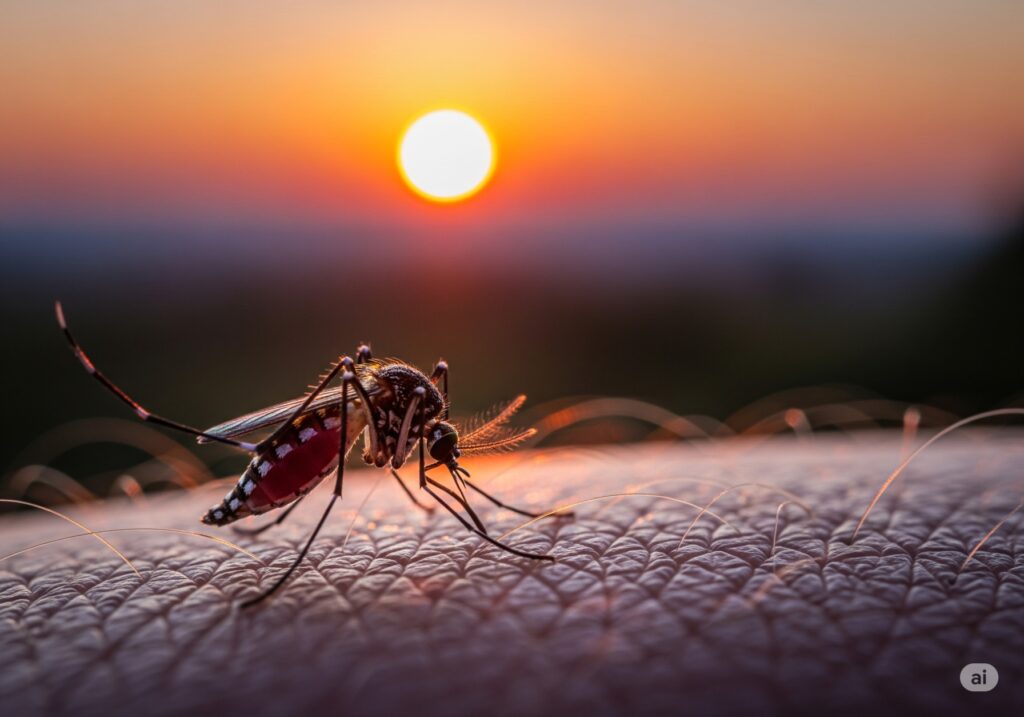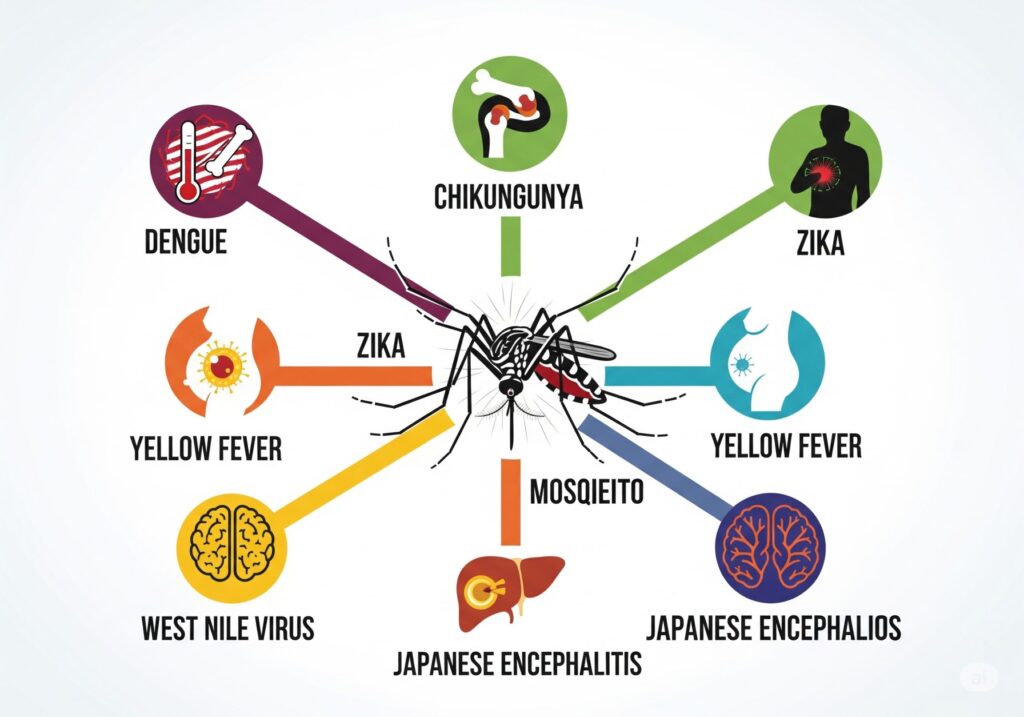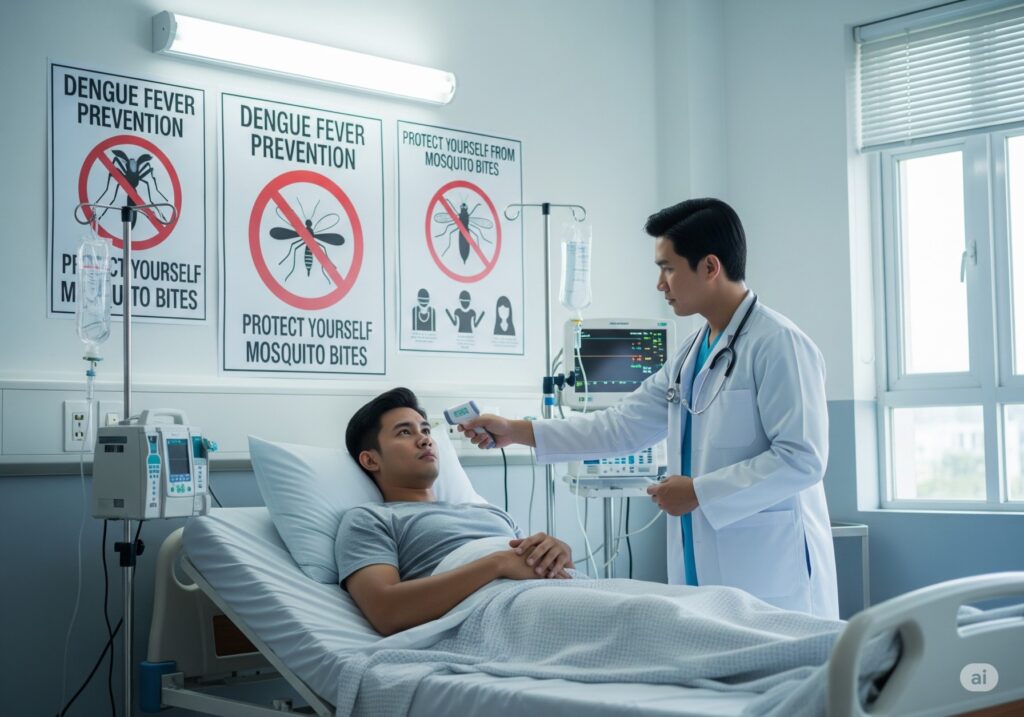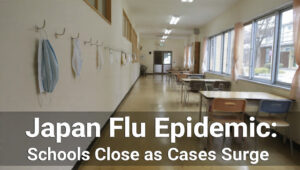
mosquito-borne diseases with no cure featured image
Learn about 6 mosquito-borne diseases with no cure, their symptoms, treatments, and simple prevention steps. Trusted sources and links included.
6 Mosquito-Borne Diseases With No Cure
Mosquitoes spread many viruses. Sadly, some of these illnesses have no specific cure. Instead, doctors give supportive care. In this article, you will learn about six mosquito-borne diseases with no cure. You’ll also get simple prevention tips. Finally, you’ll find trusted sources to read more. World Health Organization, CDC
What “mosquito-borne diseases with no cure” means
The phrase means illnesses that have no antiviral medicine or specific drug that kills the virus. Treatment focuses on easing symptoms. So, recovery depends on the person’s immune system and the care they receive. Therefore, avoiding mosquito bites is the main defense. World Health Organization, CDC
1. Dengue — a common mosquito-borne disease

Dengue is caused by the dengue virus. It spreads through Aedes mosquitoes. Symptoms include high fever, headache, joint pain, and rash. Severe dengue can cause bleeding and low blood pressure. There is no antiviral medicine for dengue. So, doctors use fluids and close monitoring to manage severe cases. Avoid NSAIDs like ibuprofen until dengue is ruled out. World Health Organization
Dengue: treatment and prevention
Treatment is supportive. Patients rest and take acetaminophen for fever. Also, timely medical care reduces risk. To prevent dengue, remove standing water and use repellents. For more, see the WHO dengue fact sheet. World Health Organization
2. Chikungunya — painful joints and long recovery
Chikungunya causes high fever and very bad joint pain. In some people, joint pain can last months or even years. No medicine cures the chikungunya virus. Hence, care focuses on pain relief and physical therapy when needed. Rest and fluids help in the early days. CDC+1
Chikungunya: what you should know
Because joint pain may become chronic, early rehabilitation matters. Also, preventing bites helps stop outbreaks. Use nets and repellents. Governments may run mosquito-control programs during outbreaks. CDC
3. Zika — no specific treatment, but major pregnancy risk
Zika virus usually causes mild symptoms. Yet it can cause birth defects if a pregnant woman is infected. There is no specific antiviral drug for Zika. Therefore, treatment is supportive: rest, fluids, and fever control. Pregnant women must avoid travel to outbreak areas and protect themselves from bites. World Health Organization
Zika prevention and pregnancy advice
If you are pregnant, speak to your doctor before traveling. Also, use mosquito nets and repellents. Public health agencies track Zika risks and publish travel advice. World Health Organization
4. Yellow fever — vaccine exists, but no cure
Yellow fever can be severe and even fatal. Luckily, a safe vaccine prevents it. But once a person is infected, there is no specific cure. Treatment is supportive. So, vaccination is the best option for travelers to risk zones. In addition, public health surveillance helps control outbreaks. CDC+1
Yellow fever: travel tip
Before traveling to parts of Africa or South America, check vaccination rules. Many countries require proof of yellow fever vaccination. Also, use bite prevention measures. CDC
5. West Nile virus — mostly supportive care
West Nile virus can cause fever, but sometimes it leads to severe brain infection. There is no antiviral drug or widely available human vaccine for West Nile. Thus, care is supportive. Older adults and people with weak immune systems have a higher risk of severe disease. Consequently, community mosquito control is key. CDC
West Nile prevention
Remove mosquito breeding sites and use screens on windows. Also, avoid outdoor activity at dusk when many mosquitoes bite. Health departments often post local risk warnings. CDC
6. Japanese encephalitis — no cure, but vaccines protect
Japanese encephalitis (JE) is rare for most travelers, yet it causes severe brain inflammation when it occurs. There is no specific antiviral treatment for JE. Treatment focuses on intensive supportive care. However, effective vaccines exist and are used in countries where JE is common. Vaccination is recommended for people who live or travel in high-risk areas. World Health Organization+1
JE: vaccine and care
Vaccination greatly reduces the risk. In addition, animal hosts like pigs and birds drive the cycle, so public health measures include agricultural controls. World Health Organization
Quick prevention checklist (use this now)
- Use EPA-registered insect repellent.
- Wear long sleeves and pants at dawn and dusk.
- Fix window screens.
- Remove standing water around homes.
- Use bed nets when needed.
- Get vaccinated if a vaccine exists and you’re at risk (e.g., yellow fever, JE). CDC, World Health Organization
Final thoughts about mosquito-borne diseases with no cure

Many mosquito-borne viruses have no specific drugs. However, most can be prevented. So, public health actions and simple personal steps matter a lot. Also, vaccines exist for some diseases. Thus, check travel advice and talk to your doctor about vaccines before travel. Lastly, if you get sick after a mosquito bite, seek medical care quickly. World Health Organization, CDC
Sources & links
- WHO — Dengue and severe dengue: https://www.who.int/news-room/fact-sheets/detail/dengue-and-severe-dengue. World Health Organization
- CDC — Chikungunya: https://www.cdc.gov/chikungunya/symptoms-diagnosis-treatment/index.html. CDC
- WHO — Zika virus: https://www.who.int/news-room/fact-sheets/detail/zika-virus. World Health Organization
- CDC — Yellow Fever: https://www.cdc.gov/yellow-fever/symptoms-diagnosis-treatment/index.html. CDC+1
- CDC — West Nile Virus: https://www.cdc.gov/west-nile-virus/symptoms-diagnosis-treatment/index.html. CDC
- WHO — Japanese encephalitis: https://www.who.int/news-room/fact-sheets/detail/japanese-encephalitis. World Health Organization
Medical Disclaimer: This article is for educational purposes only and is not a substitute for professional medical advice, diagnosis, or treatment. Always consult a qualified healthcare provider with any questions you may have about your health or before making changes to your diet or lifestyle.
Call to Action: If you found these tips helpful, share this article with friends and family. For more science-backed health insights, explore our latest blogs on Nowspress.






Can you be more specific about the content of your article? After reading it, I still have some doubts. Hope you can help me.